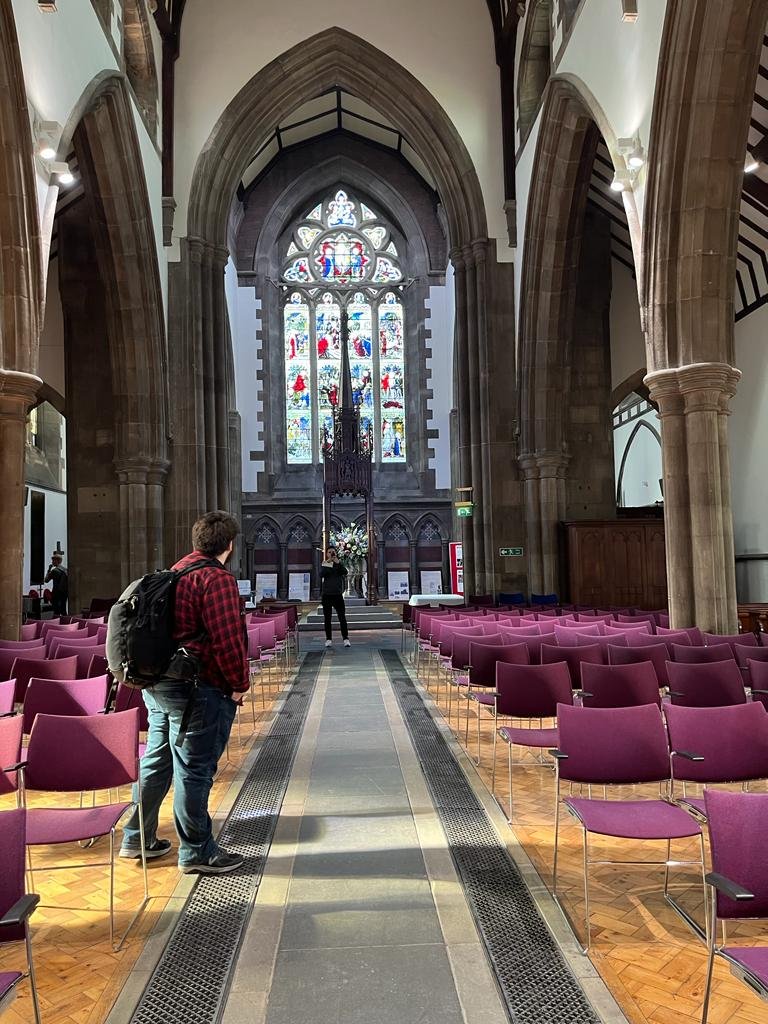A Wayward Week
Episcopalian Church in Perth. Built in the 1700s and features memorials for the Black Watch.
It’s funny how things turn out. The way to stay active is to embrace the moments of laziness, of respite. The way to not be overwhelmed by things is to do nothing, let those anxieties wash past in their illogical rigor.
I keep on thinking to myself: well, what even is there to write about? What has really changed? Why does the ‘on switch’ of dedication all of a sudden start now?
Because I’m half-way-around the damn globe for 9 months. That’s the damn reason.
Past that, there’s everything to write about. The world deserves to be appreciated.
But it’s strange, the things that distract us from being in the moment.
The first week in Scotland I got Covid. From where it matters not, the fact I got it matters not – at least not for this post.
When my family and I drove up to Inverness for the day, I could do nothing but stare out the window, cough into my mask, and intermittently dab my nose with tissue.
While relaxing and being driven, I passed by innumerable welcoming mountains and hills dotting Scotland’s promontory. This country isn’t like California, there aren’t state-choking mountain ranges that define cultures or geographic identities. Instead, Scotland’s vast expanse feels conquerable. When I look across the way, past a valley of neon-green grass, I see a mountain top that says, “conquer me.”
It's because the place is glacier-cut and sits far away from any seismic activity – most the lochs are… you know the geology isn’t anywhere near important, and I’m already getting distracted from my main point.
I sat in the van, blotting my snot, breathing out of one nostril, swerving along extraordinarily tight Scottish highland roads, and thought to myself “man, this place is beautiful, what should we write about it? How should we write about it? Should we talk about the ‘smooth promontory of a welcoming country?’ or perhaps ‘the mountains descending into a playful slope, letting the verdant greens of the valleys catch any way-ward children.”
All that is great, but in just the same way that you became distracted from the van for the abstracts of the valley, my eyes glazed over, and I physically saw those lines – as if my mind’s eye completely overtook the physical eye. In imagining how I would appreciate this beauty in the form of symbols on screens, I forgot to see the damn valley.
Due to this, I couldn’t tell you much about the drive to Inverness. It’s gorgeous. It’s green. It’s relaxing to be driven by a native who seemingly floats around corners with our bulky touring van. But, past that, I was simply watching.
There was one cool thing that stuck with me: sometimes, when it’s foggy, the gray overrides just enough of a mountain’s face as to obscure the green, the foliage, the life. That smooth, glacier-cut, curve still remains, as though the mountain were cloaked in a film of ethereal cloth. The mountain’s silhouetted edge - the darkest part of it - shines through the gray, floating mid-air like a function graphed by the atmosphere.
And so here again we arrive to the previous question: what was the goal? All of this, to think and ponder and then forget to see, only to remember to see again?
But there doesn’t have to be such a struggle with purpose, on days like those. Because it was simple. We ate in a café looking over a rushing river (a sore sight for dry Californian eyes), while being absolutely harassed by a gang of ducks, mostly mallards with their shimmering green heads, waiting for us throw them peas and French Frys and carrots.
I think that my family must’ve killed a couple of ducks from all the French Frys and bread we fed them. Ah well, deaths not in vain for the enjoyment of a tourist family, right?
Before I end and send you further down your Facebook feed, I’d like to share one image that helped me reseat my mind. A simple moment of slowness that eased me during this whirlwind of living abroad:
My warm socks against the frigid metal frame of my dorm’s window, the gusts of cold air dancing down from the crack I opened it to atop its frame. Of the cloud-filtered blue light descending from the night sky, warning day to run from its extinction. It dulls the colors of the green and yellow leaves on the tree in the courtyard, washes the reflections in the building across the way in a slight gray.
But it feels nice, to be washed, or dulled, sometimes. Because sharpness, or just acuteness in general, in emotion and experience and being – it’s hard… hard to upkeep, hard to match. There’s expectations and things with ‘impulse’ and ‘ecstasy’ and so forth. But the nice, cozy, blue wash granted to this lovely place by the cold world is comforting and nurturing in its own way. It cools down the spirit, the mind, as well as the body. It lets us slow down and foster our own heat, appreciate our own impulse in a melancholy world. Without that I know for a fact I would go crazy. Does anybody agree?

